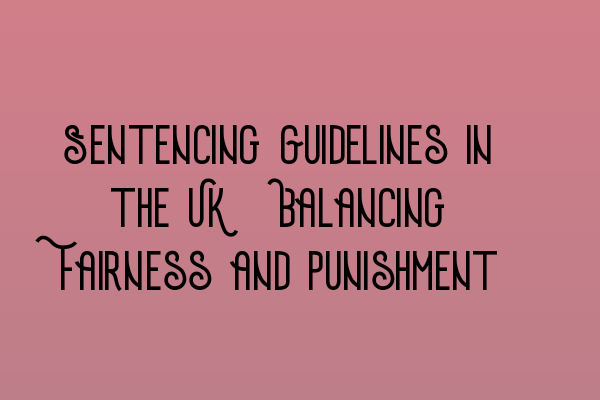Sentencing Guidelines in the UK: Balancing Fairness and Punishment
When it comes to criminal offences, one of the key aspects that every defendant and their legal representatives focus on is the potential sentence that could be imposed. It is crucial to have a clear understanding of the sentencing guidelines in the UK to ensure that the outcome is fair and just. In this blog post, we will explore the intricacies of sentencing guidelines and how they strike a balance between fairness and punishment.
Understanding Sentencing Guidelines
Sentencing guidelines are comprehensive documents created by the Sentencing Council in the UK. They provide a framework for judges and magistrates to determine the appropriate sentence for a particular offence. These guidelines consider various factors, including the nature and severity of the crime, the harm caused, the offender’s previous convictions, and any aggravating or mitigating circumstances.
The purpose of sentencing guidelines is to ensure consistency and fairness in sentencing decisions. By providing clear guidance, judges and magistrates can make informed decisions based on legal principles and societal expectations. It also allows for transparency, as defendants and their legal representatives can understand the factors that influence sentencing decisions.
The Balancing Act: Fairness and Punishment
When it comes to sentencing, there is a delicate balance between two crucial factors: fairness and punishment. On one hand, the sentence should be fair and proportionate to the severity of the offence, taking into account all relevant circumstances. On the other hand, it should serve as an adequate punishment to deter potential offenders and protect society.
The sentencing guidelines play a pivotal role in achieving this delicate balance. They provide a structured approach to sentencing, considering the specific circumstances of each case. By taking into account aggravating and mitigating factors, the guidelines ensure that the sentence reflects the individual circumstances and mitigates potential unfairness.
For instance, in cases of similar offences, the guidelines may suggest a range of sentences based on different aggravating or mitigating factors. This enables judges and magistrates to tailor the sentence to the specific circumstances, ensuring fairness and proportionality.
Linking Sentencing Guidelines to SQE Criminal Law & Practice
As an aspiring solicitor, it is essential to have a deep understanding of UK sentencing guidelines. The SQE Criminal Law & Practice exam assesses your knowledge of criminal law, including the principles and applications of sentencing guidelines. To prepare for this exam, it is crucial to enhance your understanding of sentencing guidelines and their implications.
SQE 1 Preparation Courses and SQE 2 Preparation Courses can help you develop a comprehensive understanding of criminal law, including sentencing guidelines. Additionally, taking practice exams, such as the SQE 1 Practice Exam Questions and SQE 1 Practice Mocks FLK1 FLK2, can simulate the exam environment and familiarize you with potential questions related to sentencing guidelines.
Remember, staying up to date with the latest sentencing guidelines and understanding their intricacies is crucial to providing effective legal representation in criminal law cases. By staying informed and continuously enhancing your knowledge, you can ensure fairness and justice for your clients.
In conclusion, sentencing guidelines in the UK play a vital role in striking a balance between fairness and punishment. They provide a structured approach to sentencing, ensuring that the punishment fits the crime and meets legal standards. As an aspiring solicitor, it is crucial to have a thorough understanding of these guidelines to provide effective legal representation. By continuously enhancing your knowledge through preparation courses and practice exams, you can stay ahead in your SQE Criminal Law & Practice journey.
For more information about SQE Criminal Law & Practice, SQE 1 Preparation Courses, SQE 2 Preparation Courses, and SRA SQE Exam Dates, visit the following links:
